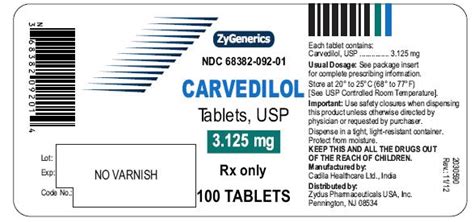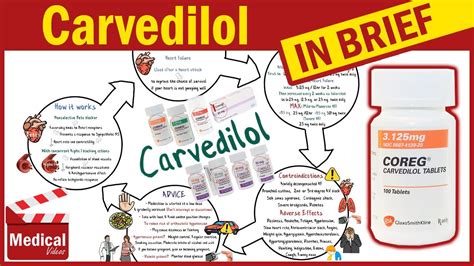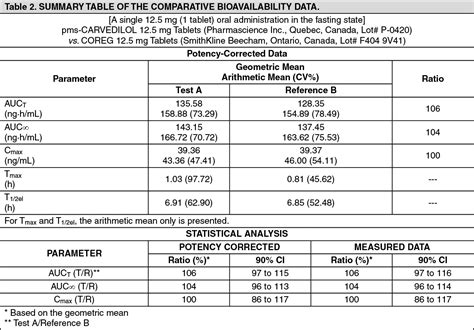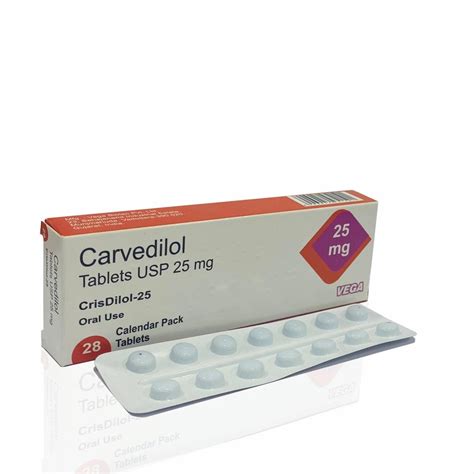Intro
Discover Carvedilol uses and benefits for heart health, including hypertension, angina, and heart failure management, with its beta-blocker properties and antioxidant effects.
Carvedilol is a medication that has been widely used in the treatment of various cardiovascular conditions, including high blood pressure, heart failure, and left ventricular dysfunction. It is a non-selective beta-blocker and alpha-1 blocker, which means it works by blocking the effects of certain chemicals in the body, such as epinephrine, that can increase heart rate and blood pressure. In this article, we will delve into the uses and benefits of carvedilol, exploring its mechanisms of action, therapeutic applications, and potential side effects.
The importance of carvedilol lies in its ability to provide comprehensive cardiovascular protection, reducing the risk of morbidity and mortality associated with heart failure, hypertension, and other related conditions. By blocking the effects of epinephrine and other stress hormones, carvedilol helps to slow the heart rate, reduce blood pressure, and decrease the workload on the heart. This can lead to improved cardiac function, reduced symptoms, and enhanced quality of life for patients with cardiovascular disease.
Carvedilol has been extensively studied in clinical trials, demonstrating its efficacy and safety in a wide range of patients, including those with mild, moderate, or severe heart failure, as well as those with hypertension, left ventricular dysfunction, and other cardiovascular conditions. The medication has been shown to reduce hospitalization rates, improve survival, and enhance functional capacity, making it a valuable treatment option for patients with cardiovascular disease.
Introduction to Carvedilol

Pharmacology and Mechanism of Action
Carvedilol is a non-selective beta-blocker, meaning it blocks both beta-1 and beta-2 adrenergic receptors. This leads to a decrease in heart rate, contractility, and cardiac output, resulting in reduced blood pressure and improved cardiac function. Additionally, carvedilol has alpha-1 blocking activity, which causes vasodilation, further reducing blood pressure and improving cardiac function. The medication also has antioxidant properties, which may help to protect against oxidative stress and inflammation in the cardiovascular system.Uses of Carvedilol

The medication is often used in combination with other cardiovascular medications, such as ACE inhibitors, diuretics, and digitalis, to provide comprehensive treatment for patients with cardiovascular disease.
Benefits of Carvedilol
The benefits of carvedilol include: * Reduced blood pressure * Improved cardiac function * Reduced symptoms of heart failure * Enhanced quality of life * Reduced risk of hospitalization and mortality * Anti-arrhythmic effects * Anti-anginal effectsCarvedilol has been shown to be effective in reducing morbidity and mortality in patients with heart failure, hypertension, and left ventricular dysfunction. The medication has also been shown to improve functional capacity, reduce symptoms, and enhance quality of life for patients with cardiovascular disease.
Side Effects of Carvedilol

These side effects are typically mild and temporary, and may resolve on their own with continued treatment. However, in some cases, side effects can be more severe and may require medical attention.
Contraindications and Precautions
Carvedilol is contraindicated in patients with: * Severe bradycardia * Severe hypotension * Cardiogenic shock * Asthma * Chronic obstructive pulmonary disease (COPD)The medication should be used with caution in patients with:
- Diabetes
- Thyroid disease
- Kidney disease
- Liver disease
- Pregnancy and breastfeeding
Dosage and Administration

It is essential to follow the dosage instructions provided by the healthcare provider and to take the medication as directed.
Interactions with Other Medications
Carvedilol can interact with other medications, including: * Beta-agonists * Alpha-agonists * Calcium channel blockers * Digitalis * ACE inhibitors * DiureticsThese interactions can increase the risk of side effects or reduce the effectiveness of the medication. It is essential to inform the healthcare provider about all medications being taken, including prescription and over-the-counter medications, vitamins, and herbal supplements.
Conclusion and Future Directions

As research continues to evolve, it is likely that new indications and uses for carvedilol will be discovered, further expanding its therapeutic potential. Additionally, the development of new formulations and delivery systems may improve the medication's efficacy and tolerability, making it an even more valuable treatment option for patients with cardiovascular disease.
Final Thoughts
In final thoughts, carvedilol is a medication that has revolutionized the treatment of cardiovascular disease, providing comprehensive cardiovascular protection and improving outcomes for patients with heart failure, hypertension, and left ventricular dysfunction. Its benefits, including reduced blood pressure, improved cardiac function, and enhanced quality of life, make it a valuable treatment option for patients with cardiovascular disease. As we continue to learn more about the medication and its effects, it is likely that carvedilol will remain a cornerstone in the treatment of cardiovascular disease for years to come.What is carvedilol used for?
+Carvedilol is used to treat high blood pressure, heart failure, left ventricular dysfunction, angina pectoris, and myocardial infarction (heart attack).
How does carvedilol work?
+Carvedilol works by blocking the effects of certain chemicals in the body, such as epinephrine, that can increase heart rate and blood pressure.
What are the benefits of carvedilol?
+The benefits of carvedilol include reduced blood pressure, improved cardiac function, reduced symptoms of heart failure, enhanced quality of life, and reduced risk of hospitalization and mortality.
We hope this article has provided you with a comprehensive understanding of carvedilol uses and benefits. If you have any questions or comments, please don't hesitate to share them with us. Your feedback is valuable to us, and we look forward to hearing from you. Additionally, if you found this article informative, please consider sharing it with others who may benefit from this information. Together, we can work towards improving cardiovascular health and reducing the burden of cardiovascular disease.
